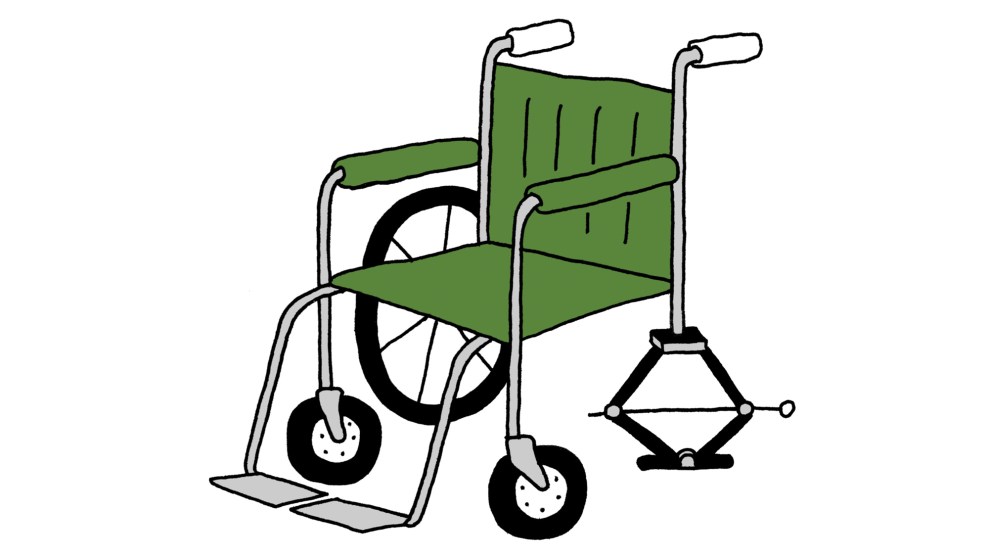Over the past four decades, private equity has become a powerful, and malignant, force in our daily lives. In our May+June 2022 issue, Mother Jones investigates the vulture capitalists chewing up and spitting out American businesses, the politicians enabling them, and the everyday people fighting back. Find the full package here.
“I don’t want to die. Please don’t let me die.”
Kendall Baker had lost count of how many times her best friend, Katie Farmer, made that desperate, tear-filled plea. Farmer spent her teens and 20s in and out of intensive eating disorder centers that helped her increase her body weight and stop behaviors like starving, vomiting, and over-exercising—at least for a time.
But a decade-and-a-half of starvation had left the 30-year-old too weak to work. In 2016, Farmer was forced to stop working and lost her private insurance. She was bumped to Medicaid, which covered her because she had no income, and Medicare, which kicked in because she was now officially disabled.
Now so frail she could barely breathe, Farmer asked her best friend to find a clinic that could help. But Baker kept running into the same problem: No facility that provided the long-term care that Farmer needed accepted Medicare or Medicaid.
“They would hear that she had Medicare and Medicaid, and the conversation would just be over,” Kendall says.
Just a few decades ago, eating disorders were considered obscure illnesses “that selectively befalls the young, rich and beautiful,” Hilde Bruch, a physician who treated anorexia at her private Houston clinic, wrote in her 1978 book The Golden Cage. “But such a disease is affecting the daughters of well-to-do, educated and successful families.”
That stereotype was often a self-fulfilling prophecy: Few insurances covered ED treatment, so only the wealthy or those willing to mortgage their homes could afford care. That seemingly changed with the passage of Mental Health Parity in 2008, followed by the Affordable Care Act four years later. Both laws forced private insurance companies to cover mental health care—including anorexia—as they would any other condition.
The laws were also the start of a private equity gold rush. When Farmer began her journeys with residential treatment in the late 2000s, most facilities were run by their founders and saw small handfuls of patients at a single location. After the ACA, private equity saw eating disorder clinics as ripe for growth, says Rebecca Lester, an anthropologist and social worker specializing in eating disorders at Washington University in St. Louis. Since the laws, the number of beds in eating disorder clinics has more than doubled, from 900 to more than 1,900.
Denver-based Eating Recovery Center is a prime example. What began as a small treatment center in 2008 has grown to 35 facilities, even as it has been bought and sold at least three times. Last winter, private equity firm CCMP Capital Advisors sold ERC to two other financial institutions for a staggering $1.4 billion, nearly three times its 2017 purchase price. (Eating Recovery Center declined to be interviewed for this piece.)
But almost no clinic owned by private equity takes anything but private insurance, even though about half of the several million adults with eating disorders have public insurance. To make matters more unfair, the for-profit clinics cherry-picked all the patients who had generous private insurance or could afford $2,000 a day out of pocket from university and hospital ED programs, which must also accept government insurance to maintain accreditation. These are the programs where therapists, dieticians, and psychiatrists get experience and training, and where innovative strategies for treating eating disorders are developed. While private rehabs grew over the last 15 years, hospital clinics have been losing beds or even shutting down completely.
When Cynthia Bulik, founding director of the University of North Carolina Center of Excellence for Eating Disorders, launched her program in 2003, it was the only ED program between Washington, DC and Florida. But the opening of UNC’s doors also lured private clinics to the area. “They very much took over the landscape,” Bulik says. “Everybody who had money was going to the programs that had glossy brochures and chefs.”
It’s a death knell for the sickest adults. After several years of slowly losing inpatient beds, UNC shuttered its full-day outpatient treatment program, a crucial service that helps prevent longer, more expensive stays.
And luxury clinics don’t actually provide better care. No controlled studies exist showing that residential treatment works better than inpatient care or partial hospitalization, where someone attends programming during the day but returns home at night, nor that longer residential stays improve recovery rates compared to short-term hospitalization. Research extolling the benefits of residential care is almost exclusively authored by the treatment centers themselves and have severe methodological flaws, according to Walter Kaye, founder and director of the Eating Disorders Program at the University of California, San Diego, and numerous other experts interviewed for this story. Nevertheless, Kaye says, treatment centers use that flawed research to claim higher recovery rates.
Attorney Steven Dunn, whose daughter, Morgan, died from anorexia in 2016, worries that an emphasis on profits over recovery is causing unqualified therapists to be hired. He filed a series of lawsuits in January 2022 against private equity-owned Alsana, alleging that a therapist at their Castlewood facility outside St. Louis was allowed to continue working even after patients began raising concerns about her behavior, which told Dunn the clinic was more concerned with its image and bottom line, rather than patient safety. Dunn also named Alsana’s private equity owners in the suit.
“They have a sacred duty to our children to do better,” Dunn says.
Because she couldn’t find a clinic that accepted Medicaid or Medicare, Farmer had to receive treatment at a medical hospital. Less than a month later, hospital staff informed her that her insurance would no longer cover her stay.
“This girl needed to be somewhere for 6 months,” Baker says, something that most hospitals couldn’t accommodate, and insurance wouldn’t cover. Instead, she was often sent home to fend for herself after just a month.
“It was just insane,” Baker says.
Farmer ended up at yet another hospital, one that had little experience treating eating disorders and none with anorexia as severe as Farmer’s. Staff struggled to care for her. Farmer’s fear about the calories in IV glucose (given to boost her deathly low blood sugar levels) caused hospital staff to stop trying to administer it. When her blood sugar plummeted, they asked Farmer to drink apple juice.
“She never drank the juice.” Kendall’s voice breaks. Two days later, on November 22, 2018, Katie’s heart failed.

















